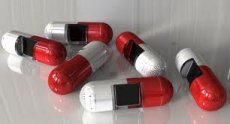New publications
The first digital tablets are getting ready to hit the market
Last reviewed: 01.07.2025

All iLive content is medically reviewed or fact checked to ensure as much factual accuracy as possible.
We have strict sourcing guidelines and only link to reputable media sites, academic research institutions and, whenever possible, medically peer reviewed studies. Note that the numbers in parentheses ([1], [2], etc.) are clickable links to these studies.
If you feel that any of our content is inaccurate, out-of-date, or otherwise questionable, please select it and press Ctrl + Enter.

Swallowable microchips embedded in tablets and pills can tell your doctor a lot about your health. In particular, they can tell you how well and regularly you follow your doctor's advice about how often and how much you should take your medication.
The first sensors of this kind have already received approval from US regulatory authorities and are preparing to enter the market. Attention, friends: the era of digital medicine is coming.
Doctors sincerely see such devices as a solution to the problem, because, according to them, at least half of patients take medications completely differently than prescribed. At least now they will be able to know in time when it is necessary to remind the patient about strict adherence to the prescription, or quickly understand why the proposed treatment does not work. The creation and production of original devices is carried out by Proteus Digital Health, one of the residents of Silicon Valley. To its credit, it should be noted that the company understands that such devices are most reminiscent of the inevitable arrival of "1984", when Big Brother will be watching even how you swallow pills.

The sensor, about the size of a grain of sand, is a tiny silicon chip containing trace amounts of magnesium and copper. When swallowed, the chip generates a small voltage in response to stomach acid, which transmits a signal to the patient’s skin, where a specially attached sticker (similar to a smoking patch) forwards the information to a mobile phone belonging to a doctor (or a hospital, not the patient).
The main candidates for rapid implementation are drugs taken by chronically ill and elderly patients. In the first case, inattention can cause a sharp progression of the disease, and in the second, the patient may simply not remember what and how he takes. Thus, the manufacturer emphasizes, the main idea of the chips is not to punish the negligent patient, but to help both patients and doctors (the latter will be able to more thoroughly track how the patient responds to treatment).
